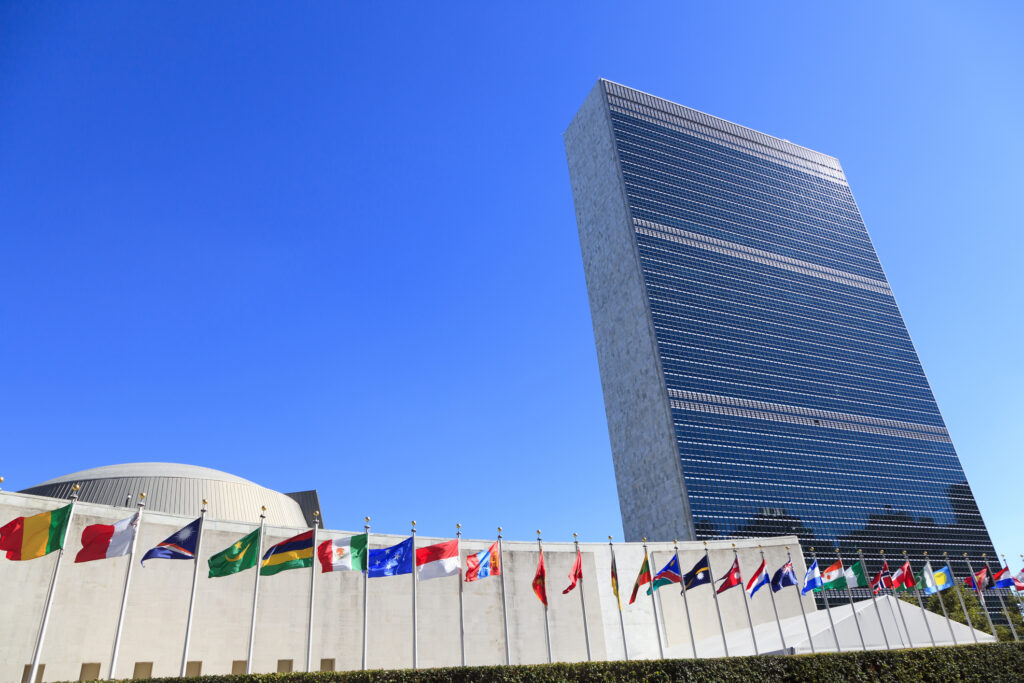New York, September 24, 2024 – The nearly 120 presidents and ministers, and some royalties, attending the opening of the UN General Assembly session are told that global affairs are shifting dangerously and the world is edging towards the unimaginable.
The week-long 79th assembly session opened while conflicts in Ukraine and the Middle East rage on while climate disasters, desperate humanitarian needs, poverty and the challenges from AI technologies and political division are defeating diplomacy.
“We are in an era of epic transformation – facing challenges unlike any we have ever seen – challenges that demand global solutions,” UN Secretary-General Antonio Guterres said in an opening address to the assembly.
“Yet geo-political divisions keep deepening. The planet keeps heating. Wars rage with no clue how they will end. And nuclear posturing and new weapons cast a dark shadow. We are edging towards the unimaginable – a powder keg that risks engulfing the world.”
Guterres said UN members should bring back multilateralism that require that all countries should work together to find solutions to the global crises. He called for an agreement to manage AI because AI could lead to “artificial divisions across the board through a great fracture with two internets, two markets, two economies and with every country forced to pick a side and enormous consequences for all.”
“The United Nations is the universal platform for dialogue and consensus”, uniquely placed to promote cooperation on AI based on the values of the Charter and international law, he said.
President Joe Biden of the United States – Referring to the wars in Ukraine, the Middle East and Sudan, President Biden said he has hope, based on his own experiences. that conflicts can be brought to an end thanks to the resilience of the human spirit and the power of reconciliation. “Things can get better,” he said. “We should never forget that. I’ve seen that throughout my career.”
“Our test is to make sure that the forces holding us together are stronger than those pulling us apart,” he said. “The choices we make today will determine our future for decades to come.”
“Now is the time for the parties to finalize its terms and bring the hostages home, ease the suffering in Gaza and end this war,” he said.
Biden pledged US support for the Sustainable Development Goals (SDGs) and climate change, including being on track to cut emissions in half by 2030.
Turning to calls for reforming the 15-nation UN Security Council, which has authority over global peace and security, but is political paralyzed by division among its members, Biden said the US supports reform, including the expansion of council members. “it’s time to move forward,” he said and to end wars and suffering.
“There will be no greater test of leadership than how we deal with AI,” he said. “Benefits from AI must be harnessed and there is a need to ensure that this technology will be used to benefit all.”
President Tayyip Erdoğan of Türkiye – “The United Nations has failed to fulfill its founding mission and has gradually become a dysfunctional structure,” he said, emphasising that “international justice cannot be left in the will of five privileged Member States of the Security Council.”
“The world is bigger than five,” he said, pointing to the massacre in Gaza, where more than 41,000 Palestinians have been killed in the continuous Israeli attacks for almost one year.
President Luiz Inacio Lula Da Silva of Brazil said the international community’s failure to respond to global crises “shows a weakening of our collective capacity for negotiation and dialogue,” as reported by UN News. Even the Pact for the Future is limited in scope. Following the COVID‑19 pandemic, no treaty on pandemics was adopted at the World Health Organization.
“We are living in a time of growing anguish, frustration, tension and fear,” he continued, noting that conflicts and military budgets have ballooned as “the use of force, not supported by international law, is becoming the rule.”
Brazil has firmly condemned the invasion of Ukraine and, together with China, has tried to encourage constructive dialogue between the parties as part of the “six-point plan”. In Gaza and the West Bank, one of the greatest humanitarian crises in recent history risks spillover into Lebanon. “What began as a terrorist action by fanatics against innocent Israeli civilians has become a collective punishment for the entire Palestinian people,” he said, with more than 40,000 deaths, mostly women and children. “The right to defence has become the right to vengeance, which prevents an agreement for the release of hostages and postpones the ceasefire.” Meanwhile the world forgets conflicts in Sudan and Yemen, which cause suffering for nearly 30 million people.
President Cyril Ramaphosa of South Africa calls for a UN Security Council that is truly representative and inclusive in order to bring an end to conflicts. “The Security Council must be reformed as a matter of urgency. It must become more inclusive so that the voices of all nations can be heard and considered.”
He said South Africa had benefited from international solidarity when the country fought to end apartheid. “We will not remain silent and watch as apartheid is perpetrated against other” countries. (By J. Tuyet Nguyen)
United Nations journalists – United Nations journalists – United Nations journalists
United Nations News – United Nations News – UN Correspondents Association – UNCA Awards

